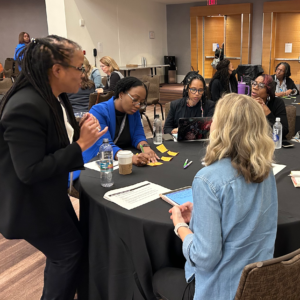First-ever Social Work Census aims to assess profession and shape its future
Findings will identify skills and knowledge needed for education and licensure
The Association of Social Work Boards, in collaboration with the Social Work Workforce Coalition, today launched the first-ever Social Work Census across the United States and Canada. The most comprehensive profession-wide study to date, the Census will generate an up-to-date picture of who today’s social workers are and what they are doing in their practice. Findings will help support the development of a more inclusive and equitable social work workforce and will be used in designing future competence assessments for social work licensure.
 “Alongside our partners in the Social Work Workforce Coalition, ASWB believes this first-of-its-kind survey of social workers will open doors for our field,” said ASWB CEO Stacey Hardy-Chandler, Ph.D., J.D., LCSW, PGDip. “Participating in the Social Work Census gives every member of the social work community a platform to share their voice and an opportunity to help bring about positive change for the future of the profession. As a social worker myself, I invite all members of the social work profession to join me in not only taking the Census but also encouraging colleagues to participate in this historic undertaking.”
“Alongside our partners in the Social Work Workforce Coalition, ASWB believes this first-of-its-kind survey of social workers will open doors for our field,” said ASWB CEO Stacey Hardy-Chandler, Ph.D., J.D., LCSW, PGDip. “Participating in the Social Work Census gives every member of the social work community a platform to share their voice and an opportunity to help bring about positive change for the future of the profession. As a social worker myself, I invite all members of the social work profession to join me in not only taking the Census but also encouraging colleagues to participate in this historic undertaking.”
Participating in the Social Work Census gives every member of the social work community a platform to share their voice and an opportunity to help bring about positive change for the future of the profession.
Complying with standards for professional regulatory associations, ASWB regularly conducts a practice analysis to assess knowledge and skills needed for entry into the profession. The online Census will expand upon practice analyses of previous years, incorporating the most comprehensive social work workforce study to date. The Census will survey current and retired social workers, social work educators, social work students, and others who work in the social work field. This research will include the collection of data on key demographic characteristics from each respondent — including gender, race, ethnicity, geography, and language use — as well as information on their educational and licensure backgrounds, and their employment and practice characteristics.
“The Social Work Census has implications for the entire profession, regardless of what organizations or interest groups you are a part of,” said Dexter Voisin, Ph.D., LCSW, President of National Association of Deans and Directors of Schools of Social Work, who serves as a member of the Social Work Workforce Coalition. “It represents important common ground and would give us crucial data which will allow us to address workforce development, strategize around service delivery gaps, and advocate for competitive salaries for social workers.”
It represents important common ground and would give us crucial data which will allow us to address workforce development, strategize around service delivery gaps, and advocate for competitive salaries for social workers.
ASWB convened the Social Work Workforce Coalition, a cross-sectional group of leading U.S. and Canadian social work organizations, to contribute questions to the Census and to promote participation among their constituencies. The Coalition hopes to gain greater insights into questions such as the amount of debt incurred by social work students during their education and the degree of pay disparity across the profession.
“This data will be invaluable in providing a more complete picture of the profession,” said Lavina Harless, MSW, LCSW, senior director of examination services at ASWB. “In seeking input from as many people as possible, the Social Work Census will help ensure that our profession’s licensing competence measures are even more reflective of today’s practice by informing the scope and topics on the next generation of social work competence assessments.”
The Census is the latest undertaking in a series of research projects being led by ASWB. As part of its research-based initiatives, ASWB worked with the Human Resources Research Organization (HumRRO), with support from The CODE Group, to conduct a series of Community Conversations, which allowed people from across the social work profession to share their unique lived experiences surrounding exam preparation, administration, and outcomes. ASWB is also funding research on social work licensure and regulation and selected three research groups — reflecting diverse national leadership and expertise — to receive a total of nearly $400,000 to evaluate exam pass rates and their implications, regulatory rules that affect the earnings of public safety and social workers, and long-term impacts of licensure changes on the workforce. Findings will be used to inform the continued development of fair, reliable, and valid competence assessments and to shape future efforts aimed at increasing equity and inclusion in the licensure process.
Social workers and social service workers can take the Census between March 1 and May 31, 2024, by visiting SWCensus.org. Each participant will be eligible to earn two hours of continuing education credit and will be invited to select from a list of charitable causes to receive a donation of $1.00. ASWB is pledging up to a total of $100,000 to support 13 organizations identified by members of the Social Work Workforce Coalition.
To participate or learn more about the Social Work Census, visit SWCensus.org.

